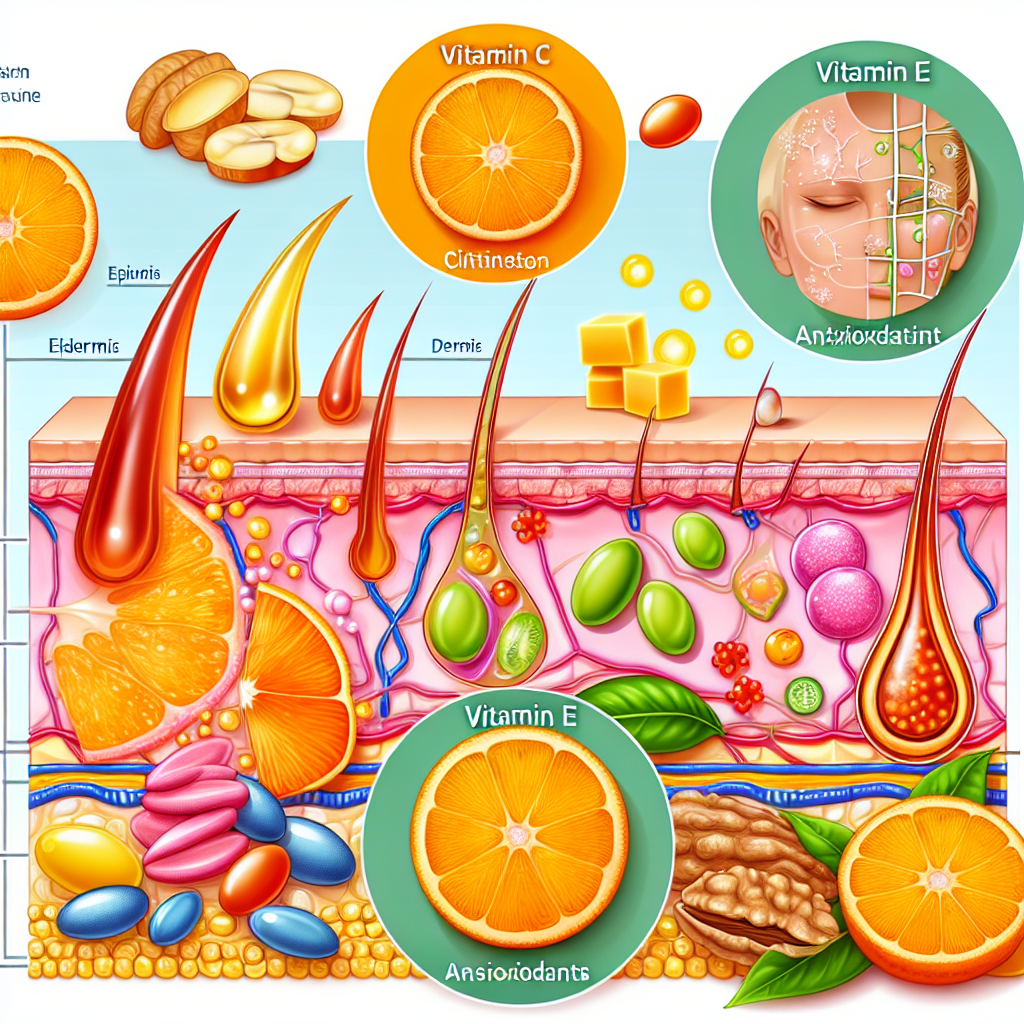How Vitamin C and E Keep Your Skin Glowing

Discover the secret to glowing skin with Vitamins C and E! Learn how these essential nutrients can enhance your skin’s health and radiance. Don’t wait, start your journey to vibrant skin today. Click here to find out more.
The Role of Vitamin C and E in Achieving Radiant Skin
The quest for radiant, glowing skin is a journey that many embark on, but few truly understand the science behind achieving this coveted glow. The secret to radiant skin lies not only in the products we apply topically but also in the nutrients we consume. Among these nutrients, two vitamins stand out for their remarkable benefits to the skin: Vitamin C and Vitamin E.
Vitamin C, also known as ascorbic acid, is a water-soluble vitamin that plays a crucial role in maintaining skin health. It is a potent antioxidant that neutralizes harmful free radicals, unstable molecules that can damage the skin cells. Free radicals are produced in our bodies due to various factors such as exposure to UV rays, pollution, and smoking. By neutralizing these free radicals, Vitamin C prevents premature aging of the skin, keeping it youthful and vibrant.
Moreover, Vitamin C is essential for the synthesis of collagen, a protein that provides structure and elasticity to the skin. As we age, our bodies produce less collagen, leading to wrinkles and sagging skin. Regular intake of Vitamin C can stimulate collagen production, thereby reducing the appearance of wrinkles and improving skin firmness.
Vitamin C also has a brightening effect on the skin. It inhibits the enzyme tyrosinase, which is responsible for the production of melanin, the pigment that gives skin its color. By inhibiting this enzyme, Vitamin C can help fade dark spots and hyperpigmentation, resulting in a more even skin tone.
On the other hand, Vitamin E, a fat-soluble vitamin, is also a powerful antioxidant that protects the skin from oxidative damage. It works synergistically with Vitamin C, enhancing its antioxidant effects. This dynamic duo provides a robust defense against environmental stressors, keeping your skin healthy and glowing.
Vitamin E also has moisturizing properties. It strengthens the skin’s barrier function, preventing moisture loss and keeping the skin hydrated. Hydrated skin is plump and radiant, so incorporating Vitamin E into your skincare routine can help you achieve that coveted glow.
Furthermore, Vitamin E has anti-inflammatory properties. It can soothe and calm irritated skin, making it beneficial for those with sensitive or inflamed skin conditions.
To reap the benefits of these vitamins, you can incorporate them into your diet and skincare routine. Foods rich in Vitamin C include citrus fruits, strawberries, bell peppers, and broccoli, while Vitamin E can be found in nuts, seeds, spinach, and broccoli.
In terms of skincare, look for serums, creams, and lotions that contain these vitamins. Apply them regularly to clean, dry skin to maximize their benefits. Remember, consistency is key when it comes to skincare.
In conclusion, Vitamin C and E are essential for achieving radiant, glowing skin. They protect the skin from oxidative damage, stimulate collagen production, brighten the skin, and keep it hydrated. By incorporating these vitamins into your diet and skincare routine, you can enhance your skin’s health and achieve that coveted glow. However, it’s important to remember that while these vitamins can significantly improve your skin’s appearance, they are not a substitute for a balanced diet, adequate sleep, and regular exercise. These lifestyle factors play a crucial role in maintaining overall skin health.
Unlocking the Secrets of Glowing Skin: The Power of Vitamins C and E

Unlocking the secrets of glowing skin is a quest that many embark on, but few truly master. The key, as it turns out, lies not in expensive creams or invasive procedures, but in the humble realm of vitamins. Specifically, vitamins C and E have been found to possess remarkable skin-enhancing properties that can help you achieve that coveted glow.
Vitamin C, also known as ascorbic acid, is a potent antioxidant that plays a crucial role in maintaining skin health. It is essential for the synthesis of collagen, a protein that provides structure and elasticity to the skin. As we age, our skin’s natural collagen production decreases, leading to the formation of wrinkles and fine lines. By boosting collagen production, vitamin C helps to maintain skin’s firmness and elasticity, thereby reducing the appearance of these aging signs.
Moreover, vitamin C has been shown to mitigate the damage caused by harmful ultraviolet (UV) radiation. Exposure to UV light generates free radicals, unstable molecules that can damage the skin cells. Vitamin C neutralizes these free radicals, preventing them from causing harm. In addition, it also inhibits the production of melanin, the pigment responsible for skin darkening. This makes it effective in reducing the appearance of dark spots and hyperpigmentation, resulting in a more even skin tone.
On the other hand, vitamin E, also known as tocopherol, is another powerful antioxidant that complements the actions of vitamin C. It is fat-soluble, meaning it is stored in the skin’s lipid layer where it provides long-lasting protection. Like vitamin C, vitamin E also neutralizes free radicals, but it is particularly effective against those produced by exposure to UV light. This makes it a valuable ally in the fight against photoaging, the premature aging of the skin caused by repeated exposure to UV radiation.
Furthermore, vitamin E has been found to have moisturizing properties. It strengthens the skin’s barrier function, reducing water loss and keeping the skin hydrated. Hydrated skin is plumper, smoother, and has a natural glow, making vitamin E essential for maintaining skin’s youthful appearance.
The synergistic effect of vitamins C and E is what makes them a formidable duo for skin health. When used together, they enhance each other’s antioxidant activity, providing more comprehensive protection against free radical damage. Moreover, vitamin C helps to regenerate vitamin E, allowing it to continue protecting the skin.
Incorporating these vitamins into your skincare routine can be done in several ways. They can be found in various skincare products such as serums, creams, and lotions. Alternatively, they can be obtained through a balanced diet rich in fruits, vegetables, nuts, and seeds.
In conclusion, the secret to glowing skin may be simpler than you think. By harnessing the power of vitamins C and E, you can protect your skin from damage, boost its collagen production, maintain its hydration, and ultimately, enhance its natural glow. So, the next time you find yourself yearning for that radiant complexion, remember to turn to these skin-loving vitamins.
How Vitamins C and E Contribute to a Healthy, Glowing Complexion
Vitamin C and E are two essential nutrients that play a significant role in maintaining a healthy, glowing complexion. They are potent antioxidants that protect the skin from harmful free radicals, promote collagen production, and help to repair damaged skin cells. This article will delve into the science behind how these vitamins contribute to a radiant complexion and why they should be a part of your skincare routine.
Vitamin C, also known as ascorbic acid, is a water-soluble vitamin that is crucial for skin health. It is a powerful antioxidant that neutralizes harmful free radicals, unstable molecules that can damage the skin cells and accelerate the aging process. By neutralizing these free radicals, vitamin C helps to prevent premature aging and maintain a youthful appearance.
Moreover, vitamin C plays a vital role in collagen synthesis. Collagen is a protein that provides structure and elasticity to the skin. As we age, our body’s collagen production decreases, leading to wrinkles and sagging skin. By promoting collagen production, vitamin C helps to maintain the skin’s firmness and elasticity, resulting in a smoother and younger-looking complexion.
Vitamin C also has brightening properties. It inhibits the enzyme tyrosinase, which is responsible for melanin production. Melanin is the pigment that gives color to our skin, hair, and eyes. By inhibiting melanin production, vitamin C helps to fade dark spots and hyperpigmentation, resulting in a more even and radiant complexion.
On the other hand, vitamin E, also known as tocopherol, is a fat-soluble vitamin that is also a potent antioxidant. Like vitamin C, it neutralizes harmful free radicals and protects the skin from environmental stressors such as UV rays and pollution. This protective action helps to prevent premature aging and maintain a healthy complexion.
Vitamin E also has moisturizing properties. It strengthens the skin’s barrier function, which helps to lock in moisture and prevent dehydration. By keeping the skin hydrated, vitamin E helps to maintain a plump and glowing complexion.
Furthermore, vitamin E has healing properties. It accelerates the skin’s healing process and helps to repair damaged skin cells. This healing action is particularly beneficial for individuals with acne-prone skin, as it can help to reduce acne scars and promote a smoother complexion.
In conclusion, vitamins C and E are essential for maintaining a healthy, glowing complexion. They protect the skin from harmful free radicals, promote collagen production, and help to repair damaged skin cells. By incorporating these vitamins into your skincare routine, you can maintain a youthful appearance and achieve a radiant complexion. However, it’s important to remember that while these vitamins can significantly improve skin health, they are not a substitute for a balanced diet, adequate hydration, and a healthy lifestyle. For optimal skin health, it’s crucial to combine a good skincare routine with a healthy lifestyle.